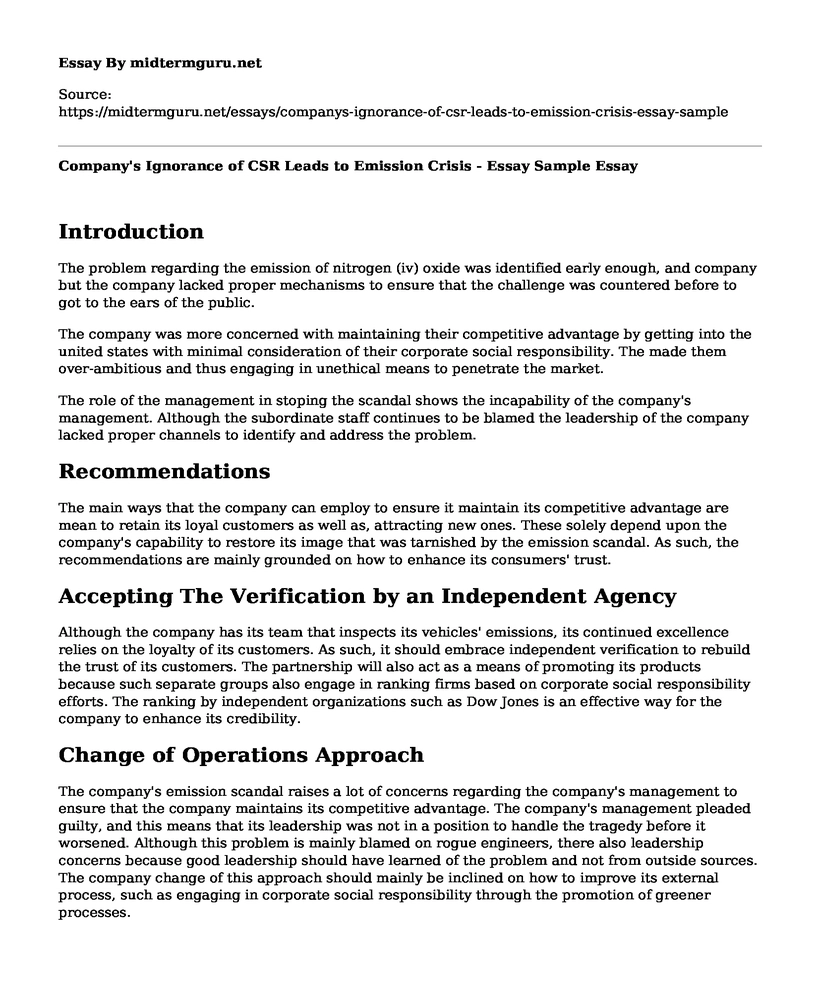Introduction
The problem regarding the emission of nitrogen (iv) oxide was identified early enough, and company but the company lacked proper mechanisms to ensure that the challenge was countered before to got to the ears of the public.
The company was more concerned with maintaining their competitive advantage by getting into the united states with minimal consideration of their corporate social responsibility. The made them over-ambitious and thus engaging in unethical means to penetrate the market.
The role of the management in stoping the scandal shows the incapability of the company's management. Although the subordinate staff continues to be blamed the leadership of the company lacked proper channels to identify and address the problem.
Recommendations
The main ways that the company can employ to ensure it maintain its competitive advantage are mean to retain its loyal customers as well as, attracting new ones. These solely depend upon the company's capability to restore its image that was tarnished by the emission scandal. As such, the recommendations are mainly grounded on how to enhance its consumers' trust.
Accepting The Verification by an Independent Agency
Although the company has its team that inspects its vehicles' emissions, its continued excellence relies on the loyalty of its customers. As such, it should embrace independent verification to rebuild the trust of its customers. The partnership will also act as a means of promoting its products because such separate groups also engage in ranking firms based on corporate social responsibility efforts. The ranking by independent organizations such as Dow Jones is an effective way for the company to enhance its credibility.
Change of Operations Approach
The company's emission scandal raises a lot of concerns regarding the company's management to ensure that the company maintains its competitive advantage. The company's management pleaded guilty, and this means that its leadership was not in a position to handle the tragedy before it worsened. Although this problem is mainly blamed on rogue engineers, there also leadership concerns because good leadership should have learned of the problem and not from outside sources. The company change of this approach should mainly be inclined on how to improve its external process, such as engaging in corporate social responsibility through the promotion of greener processes.
Re-Branding
Although it comes with a lot of risks, re-branding is another option that the company can adopt to help get out of the mess. Re-branding can make the company speed up its programs to become efficient, which can help save the company. After re-branding, they should incorporate the society to create the confidence that they are cautious about societal sustainability. This is an option that can also help the company in alleviating most of the problems that it is currently encountering. However, is expensive and as such, it can be the last option in case where the other ways do not work.
Conclusion
The Volkswagen emission scandal has had effects on the company with some of its brands such as Passat experiencing a drop in sales immediately after the scandal was revealed. The results of the diesel gate scandal have costed the company and can continue to accrue more lost if proper mechanisms are enacted to address the issue adequately. This can be made more accessible by looking at the cause of the scandal and its consequences. For instance, by looking at the effects that its likely to have on the company's brand equity, the company needs to adopt ways that can rebuild its customers' trust. As such, one of the provided is accepting the verification by an independent agency, which will aid in giving its customers the surety that the problem will be addressed and there will be no such cases in the future. Building the trust of its customers is one of the major ways that can help the company recover from the challenges and overcome the likelihood of more problems in the future.
References
Blackwelder, B., Coleman, K., Colunga-Santoyo, S., Harrison, J.S. and Wozniak, D., 2016. The Volkswagen Scandal.
Burki, T.K., 2015. Diesel cars and health: the Volkswagen emissions scandal. The Lancet Respiratory Medicine, 3(11), pp.838-839.
Mansouri, N., 2016. A case study of Volkswagen unethical practice in diesel emission test. International Journal of Science and Engineering Applications, 5(4), pp.211-216.
Rhodes, C., 2016. Democratic business ethics: Volkswagen's emissions scandal and the disruption of corporate sovereignty. Organization Studies, 37(10), pp.1501-1518.
Siano, A., Vollero, A., Conte, F. and Amabile, S., 2017. "More than words": Expanding the taxonomy of greenwashing after the Volkswagen scandal. Journal of Business Research, 71, pp.27-37.
Cite this page
Company's Ignorance of CSR Leads to Emission Crisis - Essay Sample. (2023, Feb 09). Retrieved from https://midtermguru.com/essays/companys-ignorance-of-csr-leads-to-emission-crisis-essay-sample
If you are the original author of this essay and no longer wish to have it published on the midtermguru.com website, please click below to request its removal:
- Fake News on Effects of Global Warming - Research Paper
- Essay Sample on Environmental Regulations, Standards, and Agreements
- Zero Waste Bulgaria - Essay Sample
- Startup Airline Investment: Our 10-Year Journey of Success - Essay Sample
- New Product Launch: Strategic Persuasion to Create Positive Brand Impact - Essay Sample
- Innocence Project by Barry Scheck and Peter Neufeld - Essay Sample
- L-Choco: Targeting Adults & Children for Online & Offline Marketing - Essay Sample







